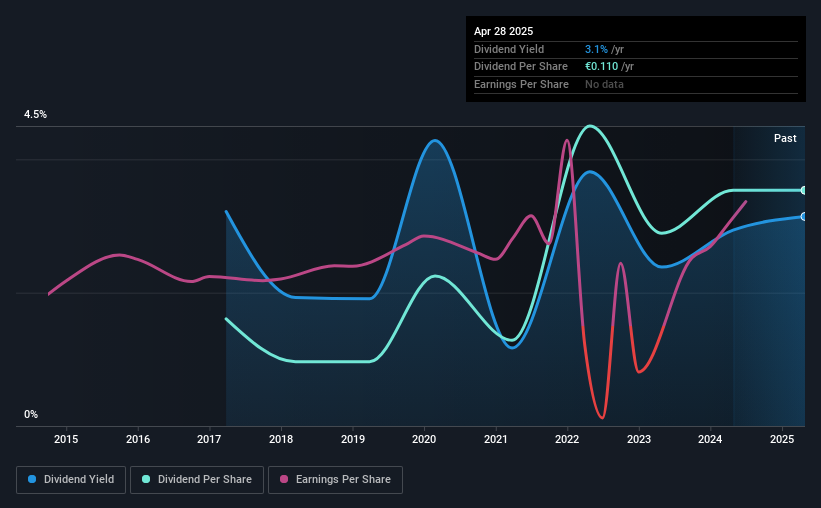- Germany
- /
- Capital Markets
- /
- XTRA:QB7
Quirin Privatbank's (ETR:QB7) Upcoming Dividend Will Be Larger Than Last Year's
Quirin Privatbank AG (ETR:QB7) has announced that it will be increasing its periodic dividend on the 11th of June to €0.16, which will be 45% higher than last year's comparable payment amount of €0.11. This takes the annual payment to 3.1% of the current stock price, which is about average for the industry.
Quirin Privatbank Will Pay Out More Than It Is Earning
We like to see a healthy dividend yield, but that is only helpful to us if the payment can continue.
Having paid out dividends for 8 years, Quirin Privatbank has a good history of paying out a part of its earnings to shareholders. Past distributions do not necessarily guarantee future ones, but Quirin Privatbank's payout ratio of 59% is a good sign for current shareholders as this means that earnings decently cover dividends.
Over the next year, EPS could expand by 4.1% if the company continues along the path it has been on recently. Assuming the dividend continues along recent trends, we think the future payout ratio could reach 97%, which probably can't continue without starting to put some pressure on the balance sheet.

See our latest analysis for Quirin Privatbank
Quirin Privatbank's Dividend Has Lacked Consistency
Even in its relatively short history, the company has reduced the dividend at least once. This suggests that the dividend might not be the most reliable. The dividend has gone from an annual total of €0.05 in 2017 to the most recent total annual payment of €0.11. This works out to be a compound annual growth rate (CAGR) of approximately 10% a year over that time. It is great to see strong growth in the dividend payments, but cuts are concerning as it may indicate the payout policy is too ambitious.
Dividend Growth May Be Hard To Achieve
With a relatively unstable dividend, it's even more important to evaluate if earnings per share is growing, which could point to a growing dividend in the future. Earnings per share has been crawling upwards at 4.1% per year. Growth of 4.1% may indicate that the company has limited investment opportunity so it is returning its earnings to shareholders instead. This isn't bad in itself, but unless earnings growth pick up we wouldn't expect dividends to grow either.
In Summary
Overall, this is probably not a great income stock, even though the dividend is being raised at the moment. While Quirin Privatbank is earning enough to cover the dividend, we are generally unimpressed with its future prospects. Overall, we don't think this company has the makings of a good income stock.
Companies possessing a stable dividend policy will likely enjoy greater investor interest than those suffering from a more inconsistent approach. At the same time, there are other factors our readers should be conscious of before pouring capital into a stock. Case in point: We've spotted 2 warning signs for Quirin Privatbank (of which 1 is a bit unpleasant!) you should know about. Looking for more high-yielding dividend ideas? Try our collection of strong dividend payers.
Valuation is complex, but we're here to simplify it.
Discover if Quirin Privatbank might be undervalued or overvalued with our detailed analysis, featuring fair value estimates, potential risks, dividends, insider trades, and its financial condition.
Access Free AnalysisHave feedback on this article? Concerned about the content? Get in touch with us directly. Alternatively, email editorial-team (at) simplywallst.com.
This article by Simply Wall St is general in nature. We provide commentary based on historical data and analyst forecasts only using an unbiased methodology and our articles are not intended to be financial advice. It does not constitute a recommendation to buy or sell any stock, and does not take account of your objectives, or your financial situation. We aim to bring you long-term focused analysis driven by fundamental data. Note that our analysis may not factor in the latest price-sensitive company announcements or qualitative material. Simply Wall St has no position in any stocks mentioned.
About XTRA:QB7
Quirin Privatbank
Primarily operates as an asset management company in Germany.
Solid track record with adequate balance sheet.
Market Insights
Weekly Picks

THE KINGDOM OF BROWN GOODS: WHY MGPI IS BEING CRUSHED BY INVENTORY & PRIMED FOR RESURRECTION


Why Vertical Aerospace (NYSE: EVTL) is Worth Possibly Over 13x its Current Price


The Quiet Giant That Became AI’s Power Grid
Recently Updated Narratives

A buy recommendation

Growing between 25-50% for the next 3-5 years

SLI is share to watch next 5 years
Popular Narratives


MicroVision will explode future revenue by 380.37% with a vision towards success


NVDA: Expanding AI Demand Will Drive Major Data Center Investments Through 2026




